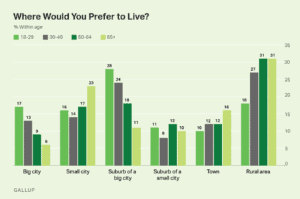People have been saying for years that they would prefer to live in rural areas.
Trulia research in 2014 showed 7% more people wanted to live in rural places than did then.
In 2018, Gallup asked people where they preferred to live. Rural came out on top for all age groups except for 18-29 year olds. With the 18-29 year olds, rural came in a surprising second.
Now people have a choice, and millions of them are planning to move.
According to UpWork:
“The pivot to remote work is the biggest, fastest transformation of the labor market since the World World II mobilization.”
- Major cities will see the biggest out-migration: 20.6% of those planning to move are currently based in a major city.
- People are seeking less expensive housing: Altogether, more than half (52.5%) are planning to move to a house that is significantly more affordable than their current home.
- People are moving beyond regular commute distances: 54.7% of people are moving over two hours away or more from their current location, which is beyond daily or even weekly commuting distances for most.
All of those data points contain some positive news for rural places and small towns looking to attract remote workers.
How small towns can attract and support remote workers
What successful towns do to attract remote workers:
- offering financial incentives
- providing coworking spaces
- building a community of remote workers
Providing co-working and alternative workspaces
One of two top ideas for small towns is to provide places to do remote work. This doesn’t have to mean a formal coworking space. Small towns can start by identifying and sharing alternative workspaces from within the community.
If you don’t have a coworking space in your town now, there are small steps you can take now. Find creative alternative places where remote workers can connect with each other and get some work done.
Where can you find unofficial coworking spaces?
- Start with the public library. They have work areas.
- Maybe a local hotel, motel or bed and breakfast has a workstation or two for guests.
- Whatever organization or business you work for, could you set up a guest workstation in your office? Economic development groups or chambers might be first to volunteer.
- Look for businesses that aren’t using all of their space.
- Maybe an insurance company has some open space up front.
- Maybe an attorney has an extra office they don’t use.
- What about the church fellowship hall or youth center? Would they accept folks for coworking?
As you share your lists of alternative work spots, you’ll be starting to build your remote work community.
Make more of the internet service you already have by improving public wifi coverage
Rural internet is exceptionally variable. Even places that look like they are served on coverage maps may in fact be dead spots. Just crossing the street in a small town can mean the difference between 30mbps and 3mbps service.
That makes public wifi even more important to supporting remote workers. Here’s how to improve the coverage of public wifi in your rural community right now.
1. Find out where free public wifi is available now. This can be as easy as driving around town with a wifi finder app or even the list of available networks on your phone.
2. Let people know about the wifi you found. Make big, consistent, simple and easy to read signs. Everywhere you find public wifi, ask them to post one of the signs.
3. Pursue more wifi. Encourage businesses of all kinds to add guest wifi. Encourage your local government to get involved. Does your local telecom offer any free wifi spots? Give them a push to start.
In places where you find wifi is locked down, ask if they can open it or provide a second network for guest access. Many routers make adding a guest network as easy as checking a box in settings.
More tips for Zoom Towns: Remote Work Ready
These tips are part of the Zoom Towns: Remote Work Ready video from SaveYour.Town. Co-founders Becky McCray (hey, that’s me!) and Deb Brown lead you through a 31 minute video. You’ll learn to position your small town for the future of remote work, without breaking your budget.
Cited in:
Balancing Act: Preserving Historic Fabric and Enhancing Economic Vitality in Towns in the Metropolitan Periphery, Planning Practice & Research, John Accordino & Sarin Adhikari, Virginia Commonwealth University, 2021 https://doi.org/10.1080/02697459.2021.1995970














Great article!!
I’ve been sharing with friends this very trend that I have been predicting since the pandemic started this whole shift!
Although—yeah—any small town could begin to capitalize on this piecemeal to some good effect, here is how I predict the big swells will go…
Yes, young professionals _will_ seek to leave the big city! I live in the Bay Area, and of course, San Francisco is _insane_! You literally have these kids who are making $100k-$200k, but they barely feel like they are _middle class_. Although S.F. does have a lot of nice things about it, it does also have lots of problems, too.
At the same time, young people like to be around other young people—let’s segment into pre-married with kids, and post-married with kids, because of course that changes things a lot. The pre married with kids ones will want to congregate in _clusters_ where they can be around other “cool” kids like themselves. So I predict that small towns/small cities with a particular accumulation of amenities will start to become hubs. —Perhaps around college towns, good transportation hubs, other nice things that people would be attracted to. Once these trends start to pick up in certain towns/small cities, there will be an exponential “runaway” effect of certain ones becoming “cool”. (As a gen-xer in the 90’s, the equivalent was Austin or Seattle.)
Part of what I predict is very attractive about this, is that I think it _might not_ be as destructive as it has been to, say, the Bay Area. Tech has just ravaged my hometown and home area. Even the ones who make the big bucks are not having the best of lives. On the other hand, if you take that same population and dilute it over lots and lots of places, I feel it could actually provide a lot of value to all of these small towns and cities. Imagine, more people who are happy to pay a premium for artisinal wares, and highly value special places, quality of life, etc. I think it could provide a second life for lots of small downtowns.
I also think if I were working for a small town, I would look into creating coworking space, and subsidizing it to get off the ground. Create some attractive infrastructure, and of course good wifi is absolutely essential as well. (If you are interested in the coworking part, my friend Iris is a consultant in this, so I will give her a shoutout: https://coworkingwithiris.co/)